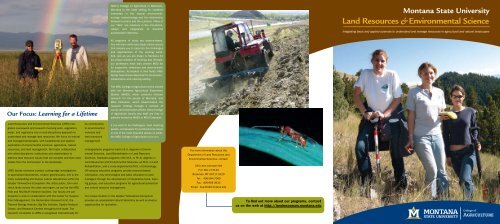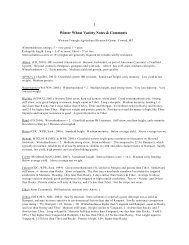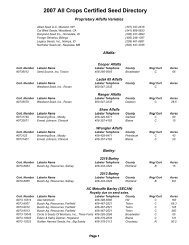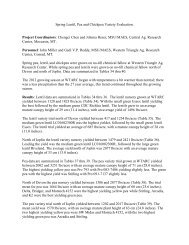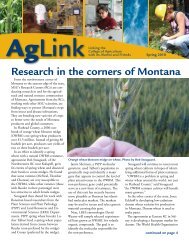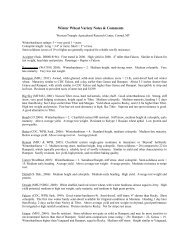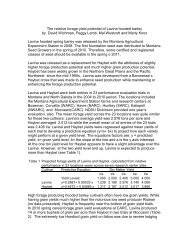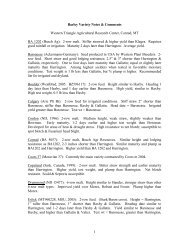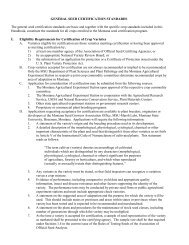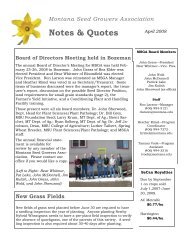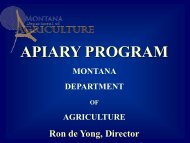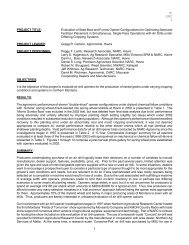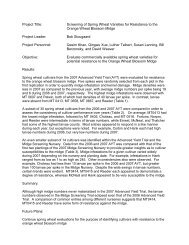Land Resources and Environmental Sciences - College of Agriculture
Land Resources and Environmental Sciences - College of Agriculture
Land Resources and Environmental Sciences - College of Agriculture
- No tags were found...
Create successful ePaper yourself
Turn your PDF publications into a flip-book with our unique Google optimized e-Paper software.
MSU’s <strong>College</strong> <strong>of</strong> <strong>Agriculture</strong> in Bozeman,Montana is the ideal setting for studentsinterested in the natural environment,ecology, biotechnology <strong>and</strong> the relationshipbetween humans <strong>and</strong> the outdoors. Many <strong>of</strong>our “labs” are outdoors in the mountains,valleys <strong>and</strong> rangel<strong>and</strong>s <strong>of</strong> beautifulsouthwestern Montana.Montana State University<strong>L<strong>and</strong></strong> <strong>Resources</strong> & <strong>Environmental</strong> ScienceIntegrating basic <strong>and</strong> applied sciences to underst<strong>and</strong> <strong>and</strong> manage resources in agricultural <strong>and</strong> natural l<strong>and</strong>scapesAll programs <strong>of</strong> study are science-based.You will learn skills <strong>and</strong> study critical issuesthat prepare you to step into the challenges<strong>and</strong> opportunities <strong>of</strong> the working world.And, just as you are drawn to Montana forits unique balance <strong>of</strong> learning <strong>and</strong> lifestyle,our pr<strong>of</strong>essors have also chosen MSU forits supportive, ambitious <strong>and</strong> down-to-earthatmosphere. As leaders in their fields, MSUfaculty have chosen Bozeman for its dynamic,collaborative <strong>and</strong> inspiring setting.Our Focus: Learning for a LifetimeThe MSU <strong>College</strong> <strong>of</strong> <strong>Agriculture</strong> works closelywith the Montana Agricultural ExperimentStation (MAES), which conducts relevantresearch for the people <strong>of</strong> Montana, <strong>and</strong>MSU Extension, which disseminates theresearch findings through a network <strong>of</strong>county <strong>and</strong> reservation <strong>of</strong>fices. Many <strong>College</strong><strong>of</strong> <strong>Agriculture</strong> faculty <strong>and</strong> staff are fully orpartially funded by MAES or MSU Extension.<strong>L<strong>and</strong></strong> <strong>Resources</strong> <strong>and</strong> <strong>Environmental</strong> <strong>Sciences</strong> (LRES) integratescoursework <strong>and</strong> research involving soils, vegetation,water, <strong>and</strong> organisms into a multi-disciplinary approach tounderst<strong>and</strong> <strong>and</strong> manage l<strong>and</strong> resources. We focus on natural<strong>and</strong> managed l<strong>and</strong>scapes, with fundamental <strong>and</strong> appliedexploration <strong>of</strong> environmental sciences, agriculture, naturalresources, <strong>and</strong> l<strong>and</strong> management. We foster collaborationwith allied disciplines, institutions <strong>and</strong> stakeholders toaddress l<strong>and</strong> resource issues that are complex <strong>and</strong> that crossscales from the microscopic to the l<strong>and</strong>scape.LRES faculty members conduct cutting-edge investigationsin specialized laboratories, modern greenhouses, <strong>and</strong> in themany outst<strong>and</strong>ing <strong>and</strong> diverse natural laboratories within theGreater Yellowstone Ecosystem. We utilize public, farm <strong>and</strong>ranch l<strong>and</strong>s across the state <strong>and</strong> region, as well as the MSUPost <strong>and</strong> Red Bluff research facilities. Our faculty are participantsin <strong>and</strong>/or collaborators with the Center for InvasivePlant Management, the Reclamation Research Unit, theThermal Biology Institute, Big Sky Institute, Spatial AnalysisCenter, <strong>and</strong> Research Centers throughout the state. Theresearch conducted in LRES is recognized internationally forits contributionsto environmentalsciences <strong>and</strong>l<strong>and</strong> resourcesmanagement.If you want to be challenged, meet inspiringpeople, <strong>and</strong> prepare for a pr<strong>of</strong>essional careerin one <strong>of</strong> the most beautiful places on earth,the MSU <strong>College</strong> <strong>of</strong> <strong>Agriculture</strong> is for you.Undergraduate programs lead to B.S. degrees in <strong>Environmental</strong><strong>Sciences</strong>, <strong>L<strong>and</strong></strong> Rehabilitation or <strong>L<strong>and</strong></strong> Resource<strong>Sciences</strong>. Graduate programs <strong>of</strong>fer M.S. or Ph.D. degrees in<strong>L<strong>and</strong></strong> <strong>Resources</strong> <strong>and</strong> <strong>Environmental</strong> <strong>Sciences</strong>, an M.S. in <strong>L<strong>and</strong></strong>Rehabilitation, <strong>and</strong> a cross-departmental M.S. in Entomology.Off-campus education programs provide research-basedinformation, new technologies <strong>and</strong> basic education to l<strong>and</strong>managers through the development <strong>of</strong> interpretive tools, learninggroups, <strong>and</strong> education programs for agricultural production<strong>and</strong> natural resource management.Our unique location in the Greater Yellowstone Ecosystemprovides an unparalleled natural laboratory as well as diverseopportunities for recreation.For more information about theDepartment <strong>of</strong> <strong>L<strong>and</strong></strong> <strong>Resources</strong> <strong>and</strong><strong>Environmental</strong> <strong>Sciences</strong>, contact:334 Leon Johnson HallP.O. Box 173120Bozeman, MT 59717-3120Tel: 406-994-7060Fax: 406-994-3933Email: lresinfo@montana.eduTo find out more about our programs, contactus on the web at http://l<strong>and</strong>resources.montana.edu
Undergraduate Degree ProgramsUndergraduate, Graduate <strong>and</strong>Postdoctoral Research OpportunitiesStudents in LRES degree programs take core courses in biology, chemistry, earth science, ecology, mathematics, physics,soil science, economics, statistics <strong>and</strong> written <strong>and</strong> oral communication. Many <strong>of</strong> our upper division courses include valuableLRES research programs <strong>of</strong>fer opportunities for advanced study beyond the B.S. degree, leading to an M.S. in <strong>L<strong>and</strong></strong>Soil <strong>and</strong> Water Sciencelaboratory experiences. A senior-level capstone field course allows students to apply classroom knowledge to h<strong>and</strong>s-on<strong>Resources</strong> <strong>and</strong> <strong>Environmental</strong> <strong>Sciences</strong>, M.S. in <strong>L<strong>and</strong></strong> Rehabilitation, M.S. in Entomology, or Ph.D. in <strong>L<strong>and</strong></strong>Faculty with expertise in soil <strong>and</strong> environmental physics,development <strong>of</strong> interdisciplinary solutions to real-world environmental problems.<strong>Resources</strong> <strong>and</strong> <strong>Environmental</strong> <strong>Sciences</strong>. Undergraduates may participate in the discovery process through originalchemistry, hydrology, watershed analysis <strong>and</strong> modeling,LRES degrees prepare students for careers in environmental sciences, agriculture, l<strong>and</strong> reclamation, <strong>and</strong> other naturalresource fields with governmental agencies, private l<strong>and</strong>owners, private industry, <strong>and</strong> the non-pr<strong>of</strong>it sector, <strong>and</strong> providestudents a strong base for advanced graduate training.B.S. in <strong>Environmental</strong> <strong>Sciences</strong>Choose from two options:The <strong>Environmental</strong> Biology option is for students interestedin the basic biology <strong>and</strong> ecology <strong>of</strong> organisms in natural <strong>and</strong>altered environments, <strong>and</strong> includes an emphasis on microbialsystems.research projects mentored by LRES faculty. Our research covers a wide range <strong>of</strong> topics, including:Agricultural SystemsIntegrate soil <strong>and</strong> crop management principles with moderntools to maximize pr<strong>of</strong>itability <strong>and</strong> environmental stewardshipin diversified cropping systems. Focal areas include:• creation <strong>of</strong> more economical practices through croppingsystems innovations• impacts <strong>of</strong> technology (precision agriculture, nutrients,herbicides, GMOs) on agricultural systems<strong>Environmental</strong> Biology <strong>and</strong> MicrobiologyResearch concerning microbial <strong>and</strong> plant ecology <strong>of</strong> natural<strong>and</strong> disturbed environments includes:• microbial ecology <strong>of</strong> extreme geothermal environmentsin nearby Yellowstone National Park• bioremediation ecology, where environmental biophysics<strong>and</strong> chemistry are combined with microbial ecology tounderst<strong>and</strong> the ecology <strong>of</strong> contaminant-degrading bacterialimnology, microbiology, nutrient cycling, pedology, l<strong>and</strong>rehabilitation <strong>and</strong> l<strong>and</strong>scape science interact on researchprojects such as:• biogeochemical cycling <strong>of</strong> trace elements associatedwith geothermal or mine impacted sites• interactions between plants <strong>and</strong> soils, including waterrelationships, plant physiological ecology, biophysics<strong>and</strong> bioremediation• interactions <strong>of</strong> climate, l<strong>and</strong>scapes, plants, soils <strong>and</strong>humansThe Soil <strong>and</strong> Water Science option prepares studentswho are interested in the physical, chemical <strong>and</strong> biologicalprocesses occurring in natural <strong>and</strong> managed soil <strong>and</strong>aquatic environments. Students gain appreciation for practicalapplications in watershed management, pollutant fate<strong>and</strong> transport, <strong>and</strong> other critical issues.B.S. in <strong>L<strong>and</strong></strong> RehabilitationThis curriculum is for students interested in reclamation <strong>and</strong>restoration ecology, including revegetation <strong>and</strong> soil remediation<strong>of</strong> sites degraded by industrial activities, recreationalactivities, invasive species or natural disturbances.B.S. in <strong>L<strong>and</strong></strong> Resource <strong>Sciences</strong>Choose from two options:The <strong>L<strong>and</strong></strong> <strong>Resources</strong> Analysis <strong>and</strong> Management optionprepares students to inventory <strong>and</strong> analyze l<strong>and</strong> resourceinformation using state-<strong>of</strong>-the-art tools for mapping (GIS <strong>and</strong>GPS) <strong>and</strong> remote sensing, <strong>and</strong> to integrate that informationwith management concerns for informed l<strong>and</strong> resource use<strong>and</strong> decision-making.The Agroecology option <strong>of</strong>fers training to work in contemporaryagricultural management. Students may specialize inapplied ecology, cropping systems, natural ecosystems, pestmanagement, or policy <strong>and</strong> planning.LRES Undergraduate MinorsThe Department <strong>of</strong>fers or supports three minor degrees:Soil Science (LRES), Entomology, <strong>and</strong> Water <strong>Resources</strong>(both shared with other campus departments).• integrated weed <strong>and</strong> insect pest management todevelop economically viable, ecologically healthy <strong>and</strong>relatively weed- <strong>and</strong> pest-resistant rangel<strong>and</strong> <strong>and</strong>cropping systems (agroecosystems)• interaction <strong>of</strong> l<strong>and</strong>scape characteristics, climate, <strong>and</strong>agronomic practices on soil <strong>and</strong> water conservation,nutrient cycling, biodiversity, <strong>and</strong> pest dynamics• l<strong>and</strong> management <strong>and</strong> cropping systems strategies thatmitigate greenhouse gas emissions or enhance soilfunctional capacityAnalysis, Management <strong>and</strong> Decision MakingApply biological, socio-economic <strong>and</strong> physical data to l<strong>and</strong>resource management. Focus areas include:• environmental <strong>and</strong> biological risk assessment withparticular emphasis on pesticides, biotechnology, <strong>and</strong>invasive species• risks <strong>and</strong> opportunities associated with climate changethrough long-term ecological research in the GreaterYellowstone <strong>and</strong> Antarctic regions• modern tools for l<strong>and</strong> analysis (satellite remote sensing,GIS, GPS, <strong>and</strong> computer decision support <strong>and</strong>simulation modeling)• documenting soil-l<strong>and</strong>scape patterns <strong>and</strong> causes <strong>of</strong>change to define strategies for using <strong>and</strong> sustainingl<strong>and</strong> resources• ecology <strong>of</strong> areas impacted by weeds, mining, recreation<strong>and</strong> other activities, including those at high elevations• microbial ecology <strong>of</strong> Antarctic ecosystems focusing onthe biogeochemistry, survival, <strong>and</strong> evolution <strong>of</strong> microbesassociated with ice• physiology, biochemistry <strong>and</strong> genetics <strong>of</strong> microbe-plantinteractionsInvasive PlantsStudy invasive plant species in managed or wild l<strong>and</strong>s, includingecologically-based management, revegetation <strong>of</strong> disturbed areas,<strong>and</strong> factors determining the distribution, survival <strong>and</strong> abundance<strong>of</strong> exotic plants. Areas <strong>of</strong> focus include:• revegetation strategies for disturbed <strong>and</strong> invasiveplant-dominated areas• factors (soil, hydrology,climate <strong>and</strong> organisms)controlling distribution <strong>and</strong>success <strong>of</strong> invasive species• evaluating above- <strong>and</strong> belowgroundmechanisms <strong>of</strong>plant/environment interactions• regulating plant communitychange to manage invasivespecies<strong>L<strong>and</strong></strong> RehabilitationResearch opportunities include partnerships with governmentagencies <strong>and</strong> private industry to develop cost-effectivereclamation methods <strong>and</strong> to evaluate critical interrelationshipswithin disturbed <strong>and</strong> reclaimed systems. Somespecific areas <strong>of</strong> inquiry are:• decision tools for large-scale l<strong>and</strong> reclamation strategies• geochemical characterization <strong>of</strong> sulfide mineral weathering• phytostabilization <strong>of</strong> acid metalliferous mining wastes• the influence <strong>of</strong> soil microorganisms on successfulrevegetation <strong>of</strong> disturbed l<strong>and</strong>s• ecological principles to restore plant communities• nutrient loading <strong>and</strong> algal growth impacts on lake,reservoir, <strong>and</strong> river quality• soil <strong>and</strong> water management alternatives to improvesurface <strong>and</strong> ground water quality, such as vegetativefilter strips, riparian <strong>and</strong>/or constructed wetl<strong>and</strong>s, riparianzone hydrology, hillslope hydrology, <strong>and</strong> hyporheiczone hydrology• l<strong>and</strong> use impacts on hydrology, vegetation, <strong>and</strong> biogeochemistry• watershed hydrologic modelingEntomologySpecialize in several areas <strong>of</strong> entomological science, <strong>and</strong>its interface with agricultural <strong>and</strong> natural resource sciences.Research areas include:• insect behavior <strong>and</strong> ecology, as they relate to insectdistribution, abundance, <strong>and</strong> evolution• using arthropods, microorganisms <strong>and</strong> other naturalenemies to regulate weed <strong>and</strong> insect pests in wildl<strong>and</strong>s<strong>and</strong> crops• integrated pest management <strong>and</strong> economic entomology forarthropod pests <strong>of</strong> small grains, forage <strong>and</strong> specialty crops• insect-plant interactions, including chemical ecology <strong>and</strong>plant <strong>and</strong> insect physiology


